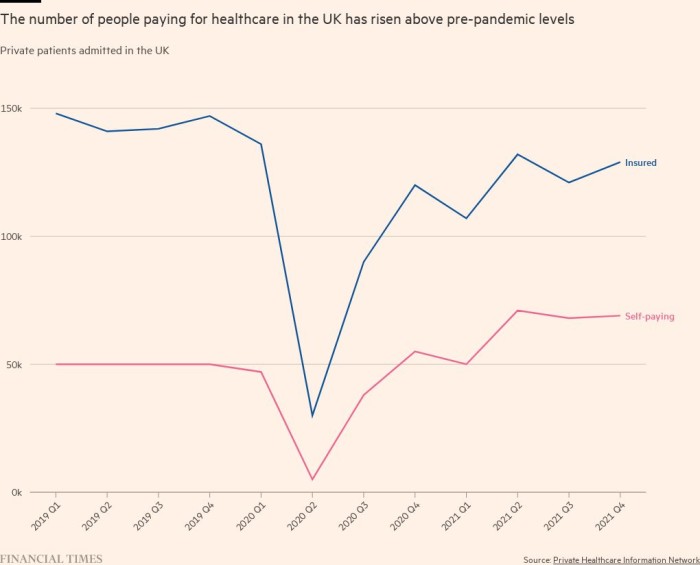Private healthcare is far from a cure all
Interest-free finance is available, the full-page advertisement proclaims. But the advertiser isn’t selling cars or sofas. It is Spire, one of the UK’s leading private hospital groups.
Growing numbers of Britons are turning to private healthcare as frustration grows with the country’s state-run health service. In its half-year results at the start of this month, Spire said it expected “significantly increased demand for healthcare” given that the waiting list for NHS treatment has swelled to almost seven million.
Only around one-fifth of Spire’s revenues come from so-called “self-payers”. Close to half comes from insurers paying for treatment under private medical plans.

We asked the hospital why they did not inform her of the charges for the various tests in advance and were told this was not possible because of “commercial confidentiality”. Different insurers are charged different prices so everything has to stay hush-hush.
The same question was put to the insurer, which told us it was the patient’s responsibility to ensure either that any tests fall within the annual limit or to make good the shortfall.
Got that? The patient has to make sure they do not over-order from a menu that has no prices. Nobody in the private care business seems to think this astonishing lack of transparency is a problem.
Sometimes it is possible to get blood tests done on the NHS. But that requires the co-operation of both the consultant and the GP, and you will have to organise them yourself.
In fact, private care entails you — the patient — doing quite a lot of organising generally. Although the bills are usually sent straight to the insurer, there is a lot of other administration. Just as in the state sector, everything moves at the pace of the slowest, and the telephone waiting times for our insurer’s helpline currently rival those of our local doctor’s surgery.
There’s also a degree of negotiating, given all the rules and limits. One morning, on the day of some pretty heavy-duty surgery on her eye, my wife was on the phone to the insurer arguing about whether the anaesthetist’s fee was included or not. It was — but not without a fight.
Private healthcare has been good for us and we cannot complain that we have not had value from the annual cost (over £2,000, if one includes the benefit-in-kind charge).
But ultimately it is a for-profit service provided by shareholder-owned companies, and inevitably that means compromises with clinical priorities. It fills some of the gaps in a state-run service that is perennially starved of resources and subject to never-ending political interference. Just not all of them.
Jonathan Eley is FT retail correspondent. Email: [email protected]; Twitter: @JonathanEley
This story originally appeared on: Financial Times - Author:Jonathan Eley
























